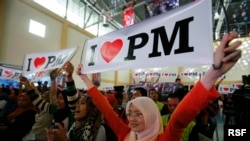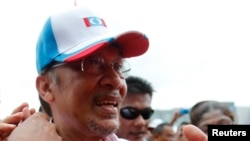KUALA LUMPUR —
Malaysia is gearing up for a cliffhanger election Sunday, one that is expected to be the closest in its history. In a country where the ruling party has been in power for 57 years, winning the support of young and first-time voters is key. Alternative media are playing a major role among Malaysia’s increasingly politicized youth.
The streets of Kuala Lumpur are lined with royal blue flags sporting a scale of justice motif. They are the campaign flags of Barisan National - Prime Minister Razak Najib’s ruling coalition.
The incumbent is going head-to-head with former deputy prime minister Anwar Ibrahim, who spent several years in prison on corruption and sodomy charges.
The ruling coalition is hoping to reverse huge gains made by Anwar in 2008, when it lost 5 out of 13 states to the opposition, and its two-thirds majority in parliament.
This year with more 23 percent of voters under the age of 30 - and two million first-time voters - there is a battle to secure the support of young Malaysians.
Vincent Qwan is a 34-year-old engineer who lives in the trendy suburb of Bangsar, a hotly contested electorate in central Kuala Lumpur.
Representing an important swing vote, Vincent said he is tired of hearing about government corruption, and it is time for the ruling coalition to go.
"I look forward to a change of government," he said. "The main reason, I want the police to work as police, a judge to work as a judge, just to serve as what they are meant to be."
Given the proliferation of social networking and online news sites, analysts say young Malaysians are growing increasingly politicized.
Newspapers, TV and radio stations are largely owned by the Malaysian government, and heavily favor the ruling party.
Vincent Qwan said he lost faith in the country’s press long ago.
"I don’t trust the local media anymore," he said. "TV, newspapers, I don’t trust them anymore. So only online source of news, there is a lot of chat by the public on the news online. I believe it is more rational as compared to bias news on Malaysia radio, newspapers."
But there is no censorship online, and niche online news websites such as Malaysiakini have been quick to fill the public appetite for independent news.
The news site is often critical of the government and over recent weeks has published stories about allegations of electoral fraud and government corruption scandals - some that are blacked out in the state media altogether.
Malaysiakini editor Steven Gan said the site plays an important role in offering an alternative voice.
"Some people would say the difference between traditional media and the Internet media is like heaven and earth. There is a vast difference there," he said. "What you read in the mainstream media, there are a lot of issues that are not being reported in the mainstream media that are being reported in the Internet media."
The ruling party has also been ramping up its presence online, launching a live stream of its press briefings and spending heavily on online advertising.
Analysts have even dubbed this, Malaysia’s first ‘social media election’ played out on the political battleground of the Internet.
Despite the lack of online censorship, several websites, including Malaysiakini and other online news sites, were the subject of well-planned cyber attacks this week.
Political analyst Tricia Yeoh, whose own website was also hacked, said it is important to ensure online news sites are not compromised on election day.
"Come election day when the election results start to stream in we really want to make sure those sites are secure so that the results can be made known immediately to the public and there’s no delay in getting the results out," said Yeoh.
Human Rights Watch this week said the Malaysian government has a duty to investigate and shut down all cyber attacks, and ensure everyone can access information without interference.
Some 13.3 million Malaysians are registered to vote in Sunday’s poll, with the preliminary results expected early Monday morning.
The streets of Kuala Lumpur are lined with royal blue flags sporting a scale of justice motif. They are the campaign flags of Barisan National - Prime Minister Razak Najib’s ruling coalition.
The incumbent is going head-to-head with former deputy prime minister Anwar Ibrahim, who spent several years in prison on corruption and sodomy charges.
The ruling coalition is hoping to reverse huge gains made by Anwar in 2008, when it lost 5 out of 13 states to the opposition, and its two-thirds majority in parliament.
This year with more 23 percent of voters under the age of 30 - and two million first-time voters - there is a battle to secure the support of young Malaysians.
Vincent Qwan is a 34-year-old engineer who lives in the trendy suburb of Bangsar, a hotly contested electorate in central Kuala Lumpur.
Representing an important swing vote, Vincent said he is tired of hearing about government corruption, and it is time for the ruling coalition to go.
"I look forward to a change of government," he said. "The main reason, I want the police to work as police, a judge to work as a judge, just to serve as what they are meant to be."
Given the proliferation of social networking and online news sites, analysts say young Malaysians are growing increasingly politicized.
Newspapers, TV and radio stations are largely owned by the Malaysian government, and heavily favor the ruling party.
Vincent Qwan said he lost faith in the country’s press long ago.
"I don’t trust the local media anymore," he said. "TV, newspapers, I don’t trust them anymore. So only online source of news, there is a lot of chat by the public on the news online. I believe it is more rational as compared to bias news on Malaysia radio, newspapers."
But there is no censorship online, and niche online news websites such as Malaysiakini have been quick to fill the public appetite for independent news.
The news site is often critical of the government and over recent weeks has published stories about allegations of electoral fraud and government corruption scandals - some that are blacked out in the state media altogether.
Malaysiakini editor Steven Gan said the site plays an important role in offering an alternative voice.
"Some people would say the difference between traditional media and the Internet media is like heaven and earth. There is a vast difference there," he said. "What you read in the mainstream media, there are a lot of issues that are not being reported in the mainstream media that are being reported in the Internet media."
The ruling party has also been ramping up its presence online, launching a live stream of its press briefings and spending heavily on online advertising.
Analysts have even dubbed this, Malaysia’s first ‘social media election’ played out on the political battleground of the Internet.
Despite the lack of online censorship, several websites, including Malaysiakini and other online news sites, were the subject of well-planned cyber attacks this week.
Political analyst Tricia Yeoh, whose own website was also hacked, said it is important to ensure online news sites are not compromised on election day.
"Come election day when the election results start to stream in we really want to make sure those sites are secure so that the results can be made known immediately to the public and there’s no delay in getting the results out," said Yeoh.
Human Rights Watch this week said the Malaysian government has a duty to investigate and shut down all cyber attacks, and ensure everyone can access information without interference.
Some 13.3 million Malaysians are registered to vote in Sunday’s poll, with the preliminary results expected early Monday morning.






